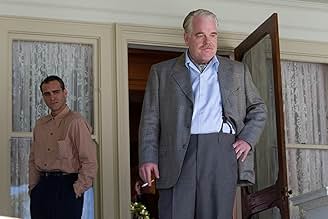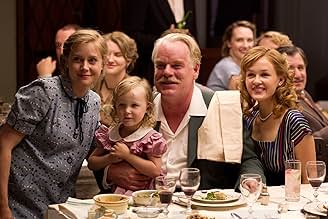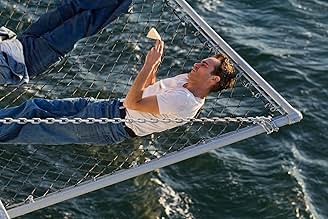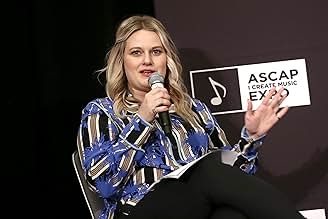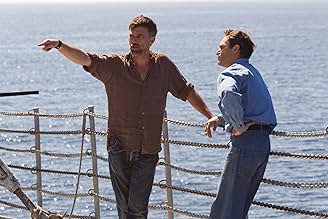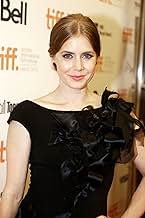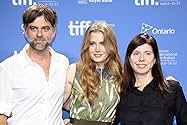Um veterano da Marinha chega em casa da guerra inseguro e incerto sobre seu futuro - até ter contato com a Causa e seu líder carismático.Um veterano da Marinha chega em casa da guerra inseguro e incerto sobre seu futuro - até ter contato com a Causa e seu líder carismático.Um veterano da Marinha chega em casa da guerra inseguro e incerto sobre seu futuro - até ter contato com a Causa e seu líder carismático.
- Direção
- Roteirista
- Artistas
- Indicado a 3 Oscars
- 75 vitórias e 187 indicações no total
Patrick Wilder
- V.A. Patient
- (as Patrick Biggs)
Avaliações em destaque
Paul Thomas Anderson has grown as perhaps the greatest American auteur of his generation. At 42, this is his 6th film (following 1996's "Hard Eight", 1997's "Boogie Nights", 1999's "Magnolia" - my all-time favorite -, 2002's "Punch-Drunk Love", and 2007's "There Will Be Blood"). Like the late master Kubrick and the aging master Terrence Malick (who, coincidentally, just debuted his 6th film, "To the Wonder", at the latest Venice Film Festival where PTA won the Silver Lion for Best Director), he isn't the most prolific of filmmakers; but his perfectionist creations, cerebral yet strikingly cinematic and emotional, always leave an indelible mark (polarizing audiences but usually earning critical acclaim). "The Master" is no exception. Shot on 70mm film, it is not so much of an "outside" epic as you'd imagine - although every single image is stunning and perfectly composed (courtesy of cinematographer Mihai Malaimare Jr., who replaced Robert Elswit, Anderson's usual collaborator). It closely resembles "There Will Be Blood" in tone and content, but it stands on its own (Jonny Greenwood is once again responsible for the score).
Freddie Quell (Joaquin Phoenix) is a troubled and troubling drifter who becomes the right-hand man of Lancaster Dodd (actor extraordinaire Philip Seymour Hoffman), "the master" of a cult named The Cause in post-WWII America. Their strange, ambiguous relationship is the center of the film. "The Master" is a thought-provoking indictment of cult fanaticism and lies sold as religion, which has caused controversy and concern among Scientologists even before its release. By not mentioning real names, Anderson is capable of broadening the scope of his story and making it richer - and subtler - than a straightforward "Scientology flick" would have been. Like his previous films, there's more than meets the eye at a single viewing, and his attention to detail pays off (there's also a visual homage to Jonathan Demme's "Melvin and Howard", another favorite of Anderson's, in a motorcycle racing scene). Hoffman is as good as ever, and Amy Adams is highly effective (slowly depriving herself of cutesy mannerisms) as his wife. David Lynch's golden girl Laura Dern has a small role as well. But this is Joaquin Phoenix's hour, all the way. River Phoenix's younger brother has become a fascinating actor himself since Gus Van Sant's dark comedy "To Die For" (1995), and, after his much publicized "retirement from acting" and music career hoax in 2009, he managed to come back with a performance for the ages, which shall culminate in Oscar gold. As for Anderson, it is unsure whether the Academy will finally recognize him as he deserves. His films may still be too outlandish for the Academy's taste (he's announced his next project will be an adaptation of Thomas Pynchon's crime novel "Inherent Vice", a seemingly less ambitious project he hopes to make in less than five years). Regardless of Oscar numbers, we can rest assured that in a world where PTA gets to make such personal and original work and find his audience, there is still hope, and room, for intelligent filmmaking.
Freddie Quell (Joaquin Phoenix) is a troubled and troubling drifter who becomes the right-hand man of Lancaster Dodd (actor extraordinaire Philip Seymour Hoffman), "the master" of a cult named The Cause in post-WWII America. Their strange, ambiguous relationship is the center of the film. "The Master" is a thought-provoking indictment of cult fanaticism and lies sold as religion, which has caused controversy and concern among Scientologists even before its release. By not mentioning real names, Anderson is capable of broadening the scope of his story and making it richer - and subtler - than a straightforward "Scientology flick" would have been. Like his previous films, there's more than meets the eye at a single viewing, and his attention to detail pays off (there's also a visual homage to Jonathan Demme's "Melvin and Howard", another favorite of Anderson's, in a motorcycle racing scene). Hoffman is as good as ever, and Amy Adams is highly effective (slowly depriving herself of cutesy mannerisms) as his wife. David Lynch's golden girl Laura Dern has a small role as well. But this is Joaquin Phoenix's hour, all the way. River Phoenix's younger brother has become a fascinating actor himself since Gus Van Sant's dark comedy "To Die For" (1995), and, after his much publicized "retirement from acting" and music career hoax in 2009, he managed to come back with a performance for the ages, which shall culminate in Oscar gold. As for Anderson, it is unsure whether the Academy will finally recognize him as he deserves. His films may still be too outlandish for the Academy's taste (he's announced his next project will be an adaptation of Thomas Pynchon's crime novel "Inherent Vice", a seemingly less ambitious project he hopes to make in less than five years). Regardless of Oscar numbers, we can rest assured that in a world where PTA gets to make such personal and original work and find his audience, there is still hope, and room, for intelligent filmmaking.
This is one of those films which the critics were nearly-unanimous in offering universal praise and yet audiences seemed to be relatively dismissive. (The film didn't quite make back its money at the box office.) The performances of Joaquin Phoenix, Philip Hoffman, and the rest of the cast were outstanding, along with the dialog which seems perfectly suited to its characters. Even the sets of the late 1940's and early 1950's were superb. And there are a number of surprising moments in which you don't know where the story is headed. However, by the film's end, I felt like there was something missing, as if the filmmakers were reluctant to take a risk with the material and say something about their subject through the story. About the last half of the film, the story meanders and never finds again its pace or goal.
The film is about the obsession of cult groups which try to answer life's riddles for troubled people. In this case, the group and its leader appear very loosely inspired by Scientology and L. Ron Hubbard, called "the Cause" whose leader is Lancaster Dodd (Hoffman). Although Hoffman plays the title role, the story is really about an ex-naval officer Freddie Quell (Phoenix) who is suffering from PTSD as a result of his involvement in World War II. After the war, he is a lost soul roaming through life with a series of misadventures, such as attacking a customer when he works for a department store as a photographer, or accidentally offering a poisonous drink to a migrant worker.
At his lowest point, he wakes up on board some kind of small yacht and meets a strange man, Lancaster Dodd, who informs him he's aboard his ship at Quell's request, although our protagonist can't remember having boarded. Quell learns about Dodd at their first meeting who states "I am a writer, a doctor, a nuclear physicist and a theoretical philosopher, but above all, I am a man, a hopelessly inquisitive man, just like you." He also says people attack him for his "dangerous" ideas. Slowly, Quell learns that Dodd is head of some kind of an underground movement combining philosophy and pseudo-science and publishes books on some far-fetched ideas which probably have no scientific basis. Dodd is often referred to as simply "Master" by members of this group. Dodd and his group believe the way to "heal" troubled people is by cleansing their souls through a hypnotic process which attempts to heal injuries inflicted during past lives.
Probably the most compelling part of the film is the first half, where we as the audience learn about Dodd and the Cause through the eyes of Quell. The most captivating moment is when Dodd is accused of not only illegally accepting a large donation from a philanthropist through a foundation, but practicing medicine without a license. I thought the film would focus on these accusations, but then the film leaves these indictments far behind. Afterwards, the film meanders, a bit like Quell at the beginning. The film becomes an episodic montage of interesting moments which are rather disconnected. By film's end, I didn't feel much more was revealed about Dodd and his Cause than when Quell first joined during the first third of the film.
Although all the acting is right on the money including outstanding performances by Hoffman and Phoenix, and the script dialog was absolutely true the characters, the entire film was kind of dissatisfying. We as the audience are given hints of the politics of Dodd and his inner circle but often these ideas are never fully developed. Also, much screen time was devoted to many of the "past life" sessions conducted by Dodd, but I think at some point it became wasted screen time. After 3 or 4 sessions, I pretty much understood the idea but instead countless others are offered without giving much insight into Dodd and who he is. By film's end, "The Master" was more like a character study than a story. A noble effort that wasn't quite there for me.
The film is about the obsession of cult groups which try to answer life's riddles for troubled people. In this case, the group and its leader appear very loosely inspired by Scientology and L. Ron Hubbard, called "the Cause" whose leader is Lancaster Dodd (Hoffman). Although Hoffman plays the title role, the story is really about an ex-naval officer Freddie Quell (Phoenix) who is suffering from PTSD as a result of his involvement in World War II. After the war, he is a lost soul roaming through life with a series of misadventures, such as attacking a customer when he works for a department store as a photographer, or accidentally offering a poisonous drink to a migrant worker.
At his lowest point, he wakes up on board some kind of small yacht and meets a strange man, Lancaster Dodd, who informs him he's aboard his ship at Quell's request, although our protagonist can't remember having boarded. Quell learns about Dodd at their first meeting who states "I am a writer, a doctor, a nuclear physicist and a theoretical philosopher, but above all, I am a man, a hopelessly inquisitive man, just like you." He also says people attack him for his "dangerous" ideas. Slowly, Quell learns that Dodd is head of some kind of an underground movement combining philosophy and pseudo-science and publishes books on some far-fetched ideas which probably have no scientific basis. Dodd is often referred to as simply "Master" by members of this group. Dodd and his group believe the way to "heal" troubled people is by cleansing their souls through a hypnotic process which attempts to heal injuries inflicted during past lives.
Probably the most compelling part of the film is the first half, where we as the audience learn about Dodd and the Cause through the eyes of Quell. The most captivating moment is when Dodd is accused of not only illegally accepting a large donation from a philanthropist through a foundation, but practicing medicine without a license. I thought the film would focus on these accusations, but then the film leaves these indictments far behind. Afterwards, the film meanders, a bit like Quell at the beginning. The film becomes an episodic montage of interesting moments which are rather disconnected. By film's end, I didn't feel much more was revealed about Dodd and his Cause than when Quell first joined during the first third of the film.
Although all the acting is right on the money including outstanding performances by Hoffman and Phoenix, and the script dialog was absolutely true the characters, the entire film was kind of dissatisfying. We as the audience are given hints of the politics of Dodd and his inner circle but often these ideas are never fully developed. Also, much screen time was devoted to many of the "past life" sessions conducted by Dodd, but I think at some point it became wasted screen time. After 3 or 4 sessions, I pretty much understood the idea but instead countless others are offered without giving much insight into Dodd and who he is. By film's end, "The Master" was more like a character study than a story. A noble effort that wasn't quite there for me.
Paul Thomas Anderson's "The Master" is a puzzling, often bewildering film. Very few films have left me shaken and stirred and still leave me wondering, "What was that all about?" I can't say that I hated the ride. It is, quite simply, a remarkable film from one of America's best filmmakers today. This film is not for everyone, however.
The film's center plot; the one about self-described nuclear physicist, philosopher and professor Lancaster Dodd and his "organization" "The Cause" - as seen from the point of view from a shell-shocked psychotic drunk Freddie Quell. During the course of the film Lancaster and Freddie bond somewhat with Lancaster progressing his latest works.
The main performances by Joaquin Phoenix and Philip Seymour Hoffman are superb, and should warrant both of them Academy Award Nominations for Best Actor. Both of them. Phoenix is literally on fire here, his quirky mannerisms, twitching lips, unforgiving, unsettling eyes and ferocious anger and voice had me on the edge every time I see him on screen. Hoffman also is more subtle, though we see growing anger and rage whenever he feels that his work is being threatened. He can be classy, charismatic, and when threatened, loses all of that and becomes about as desperate as Freddie. Brilliant work by both actors. Watch the scene where Lancaster gets through to Freddie, or the harrowing scene where both of them are in jail cells. Special mention to Amy Adams who, while not really standing out, gives off a peculiar and somewhat sinister aura whenever she's on the screen.
Anderson's solid screenplay and his concentrated direction bring the goods. There seems to be a pattern about Anderson's last three films including this one. Both "Punch-Drunk Love" and "There Will Be Blood" featured lead characters who are extremely lonely and prone to snap to anger. "The Master" is somewhat a bit of both, where the lonely man can be both psychotic without reason and yet there are scenes which show he is, after all, a man. Some very well written lines ("If you can find peace without looking up to a master, any master...") meshed with some really great cinematography by Mihai Malaimare Jr. that brings nice color tones to the 1950 production design. Complementing all of this is Jonny Greenwood's eerie, dissonant score which makes the movie all the more odd, unsettling, and yet compelling to watch.
Eventually, both men in the movie are the masters of their own fate, and Anderson his own. It may move some and it may turn away others, but this is a fascinating watch nonetheless. "The Master" is one of 2012's very best films.
Overall: 91%
The film's center plot; the one about self-described nuclear physicist, philosopher and professor Lancaster Dodd and his "organization" "The Cause" - as seen from the point of view from a shell-shocked psychotic drunk Freddie Quell. During the course of the film Lancaster and Freddie bond somewhat with Lancaster progressing his latest works.
The main performances by Joaquin Phoenix and Philip Seymour Hoffman are superb, and should warrant both of them Academy Award Nominations for Best Actor. Both of them. Phoenix is literally on fire here, his quirky mannerisms, twitching lips, unforgiving, unsettling eyes and ferocious anger and voice had me on the edge every time I see him on screen. Hoffman also is more subtle, though we see growing anger and rage whenever he feels that his work is being threatened. He can be classy, charismatic, and when threatened, loses all of that and becomes about as desperate as Freddie. Brilliant work by both actors. Watch the scene where Lancaster gets through to Freddie, or the harrowing scene where both of them are in jail cells. Special mention to Amy Adams who, while not really standing out, gives off a peculiar and somewhat sinister aura whenever she's on the screen.
Anderson's solid screenplay and his concentrated direction bring the goods. There seems to be a pattern about Anderson's last three films including this one. Both "Punch-Drunk Love" and "There Will Be Blood" featured lead characters who are extremely lonely and prone to snap to anger. "The Master" is somewhat a bit of both, where the lonely man can be both psychotic without reason and yet there are scenes which show he is, after all, a man. Some very well written lines ("If you can find peace without looking up to a master, any master...") meshed with some really great cinematography by Mihai Malaimare Jr. that brings nice color tones to the 1950 production design. Complementing all of this is Jonny Greenwood's eerie, dissonant score which makes the movie all the more odd, unsettling, and yet compelling to watch.
Eventually, both men in the movie are the masters of their own fate, and Anderson his own. It may move some and it may turn away others, but this is a fascinating watch nonetheless. "The Master" is one of 2012's very best films.
Overall: 91%
Yes, herein contains some of the most ravishing filmmaking of the new millennium. The period details are abstract yet precise. The score has a stark, primordial allure. It's post-WWII America: Psychologically scarred veterans attempt to cramp themselves back into society. One is loner Freddie Quell, adrift in emotional confusion. He's secured a gig as a portrait photographer at a lavish department store imagined like a temple of indulgent commercialism. But Freddie doesn't last long there. In the darkroom, he screws models and chugs rotgut he makes with photo chemicals. Ultimately, he loses it on a customer, not just hitting him but harassing and lambasting him, working out some indecipherable, irrepressible rage.
Phoenix's performance as Freddie reduces all he's done before to a preparation exercise. He longs for something, but even he can't tell you what, and that sorrow has clotted into self- destructive ritual. We see his snarly face from angles we haven't seen before. We're not sure if his leery eyes are hateful or if he's dead inside. He's a captivating animal.
Then he meets stout, articulate Lancaster Dodd, always circled by people who treat him like a prodigy, hanging on his every word, laughing at all his mugging. Lancaster fancies himself a renaissance man. He's married to Peggy, who's much more vigilant than we first think. His son trails the proceedings with a dormant pose of derision. His daughter marries a man who, like everyone else in their clique, views him as a wizard.
The film belongs to Phoenix, but Hoffman more than does his thing, his affectations ringing with conceit and fraudulence. Freddie---father dead, mother institutionalized---is naturally drawn to Dodd, who promises answers, mental freedom, happiness, even claims to cure leukemia. He's written a book his bootlickers treat as a sort of bible. He loves to charm and perform.
It's well-known that Lancaster's cult is inspired by L. Ron Hubbard's Scientology. It's not direct, but the manner in which Lancaster draws Freddie into the fold, among other things, is unmistakably influenced by the contentious institution and Hubbard's life. Paul Thomas Anderson doesn't bind to that inspiration for his movie...but he doesn't bind to anything, really. You walk out muddled, wearied, wondering where to start in connecting the dots in this elegant, arresting movie. The story is as confounding as its technique is magnificent.
Anderson, the true wunderkind of the Tarantino generation, sets everything up so beautifully, you wait for the turning point to prevail so the intrigue can come to boil. Instead, nothing progresses. The dramatic developments seem to dwindle and become less consistent as the movie drifts along, and Anderson throws in pauses, like a lingering desert scene or an outstretched montage in which Freddie is made to pace in a room, that slow the movie to a drudge. Freddie's sex preoccupation, which was stressed in the film's early stretch, grows dissonant. It's less about narrative arc and more the emotional condition of two men, a twist of trust and mistrust, id and superego. PTA's vision is grand in scope, but his result is not so much ambiguous as opaque and detached.
For the first time in his immaculate career, the greatest filmmaker of his generation seems to languish. His newfound frigidness makes the film easy to admire but difficult to love. Anderson is so stunningly impressive, in fact, that it's taken me two viewings of The Master to admit all this to myself. Understandably, some critics have patronized it as deliberately evasive and occult, but isn't that just double-talk? A glorification of an artist's failure to proportionately bear his ideas? Something particularly intriguing is how the movie poses questions not so much about the importance of faith, but how far the human limit for change can extend and to confront emotional devastation so heavy it can never recover. But the film is too ambivalent or cautious to probe them in depth. By the end, it's become an opaque challenge between two phenomenal actors whose commitment to their roles is awe-inspiring, but it's manacled to a work so in awe of itself, the audience gets blockaded.
Phoenix's performance as Freddie reduces all he's done before to a preparation exercise. He longs for something, but even he can't tell you what, and that sorrow has clotted into self- destructive ritual. We see his snarly face from angles we haven't seen before. We're not sure if his leery eyes are hateful or if he's dead inside. He's a captivating animal.
Then he meets stout, articulate Lancaster Dodd, always circled by people who treat him like a prodigy, hanging on his every word, laughing at all his mugging. Lancaster fancies himself a renaissance man. He's married to Peggy, who's much more vigilant than we first think. His son trails the proceedings with a dormant pose of derision. His daughter marries a man who, like everyone else in their clique, views him as a wizard.
The film belongs to Phoenix, but Hoffman more than does his thing, his affectations ringing with conceit and fraudulence. Freddie---father dead, mother institutionalized---is naturally drawn to Dodd, who promises answers, mental freedom, happiness, even claims to cure leukemia. He's written a book his bootlickers treat as a sort of bible. He loves to charm and perform.
It's well-known that Lancaster's cult is inspired by L. Ron Hubbard's Scientology. It's not direct, but the manner in which Lancaster draws Freddie into the fold, among other things, is unmistakably influenced by the contentious institution and Hubbard's life. Paul Thomas Anderson doesn't bind to that inspiration for his movie...but he doesn't bind to anything, really. You walk out muddled, wearied, wondering where to start in connecting the dots in this elegant, arresting movie. The story is as confounding as its technique is magnificent.
Anderson, the true wunderkind of the Tarantino generation, sets everything up so beautifully, you wait for the turning point to prevail so the intrigue can come to boil. Instead, nothing progresses. The dramatic developments seem to dwindle and become less consistent as the movie drifts along, and Anderson throws in pauses, like a lingering desert scene or an outstretched montage in which Freddie is made to pace in a room, that slow the movie to a drudge. Freddie's sex preoccupation, which was stressed in the film's early stretch, grows dissonant. It's less about narrative arc and more the emotional condition of two men, a twist of trust and mistrust, id and superego. PTA's vision is grand in scope, but his result is not so much ambiguous as opaque and detached.
For the first time in his immaculate career, the greatest filmmaker of his generation seems to languish. His newfound frigidness makes the film easy to admire but difficult to love. Anderson is so stunningly impressive, in fact, that it's taken me two viewings of The Master to admit all this to myself. Understandably, some critics have patronized it as deliberately evasive and occult, but isn't that just double-talk? A glorification of an artist's failure to proportionately bear his ideas? Something particularly intriguing is how the movie poses questions not so much about the importance of faith, but how far the human limit for change can extend and to confront emotional devastation so heavy it can never recover. But the film is too ambivalent or cautious to probe them in depth. By the end, it's become an opaque challenge between two phenomenal actors whose commitment to their roles is awe-inspiring, but it's manacled to a work so in awe of itself, the audience gets blockaded.
What is the nature of man? Is he so depraved and aberrated that he must grovel in his own misery all the days of his life? Or is he merely asleep, bound by the negative emotions of his previous existences, hoping that his perfect nature will be resurrected one fine day? Director Paul Thomas Anderson has long been heralded as a philosopher of the human condition. In his 2012 film, The Master, Anderson employs powerful performances by Joaquin Phoenix and Philip Seymour Hoffman to readdress themes he discussed in There Will Be Blood (2007).
Freddie Quell (Phoenix) is a Navy WWII veteran with an insatiable lust for sex and alcohol. After accidently producing a batch of liquor that kills a man in Salinas, he flees and hides away aboard a boat captained by Lancaster Dodd (Hoffman). Dodd is the leader of a budding cult which appears all too similar to L. Ron Hubbard's Scientology. Over several months and multiple "processing" sessions Dodd hopes to cure Quell of his "animal" tendencies. The film spirals as it begs to resolve who will be the master and who will be the slave.
Anderson offers a honest vignette of humanity, painting fleshly desire and moral rationalism plainfully for all to see. The Master's audience walks away in fear, identifying their lowest self with Dodd's actions. The film's emotional response is greatly in part due to Phoenix and Hoffman's explosive chemistry. The duo delivers possibly the greatest scene of dialogue in the last 50 years. Anderson, who also wrote the screenplay, perfectly crafts the film's hypnotic and symbolic interchanges. Every frame is visually striking thanks to Mihai Malaimare Jr.'s cinematography. Often, more than not, more can be gleaned from scenes' blocking than actual words or action. Characters appear larger when they are in control and symmetrical shots are largely abandoned to display who is the scene' subject.
The Master is a film for thinking. No viewer is allowed to be numb during its showcasing. This principle likely played to a drop in its commercial success, but it reminds us that there is still room in the world for gorgeous shots, heavy subtext, and low concept plots. The Master, along with There Will Be Blood and Inherent Vice, has printed Anderson's name in the annals of brilliant filmmakers.
Freddie Quell (Phoenix) is a Navy WWII veteran with an insatiable lust for sex and alcohol. After accidently producing a batch of liquor that kills a man in Salinas, he flees and hides away aboard a boat captained by Lancaster Dodd (Hoffman). Dodd is the leader of a budding cult which appears all too similar to L. Ron Hubbard's Scientology. Over several months and multiple "processing" sessions Dodd hopes to cure Quell of his "animal" tendencies. The film spirals as it begs to resolve who will be the master and who will be the slave.
Anderson offers a honest vignette of humanity, painting fleshly desire and moral rationalism plainfully for all to see. The Master's audience walks away in fear, identifying their lowest self with Dodd's actions. The film's emotional response is greatly in part due to Phoenix and Hoffman's explosive chemistry. The duo delivers possibly the greatest scene of dialogue in the last 50 years. Anderson, who also wrote the screenplay, perfectly crafts the film's hypnotic and symbolic interchanges. Every frame is visually striking thanks to Mihai Malaimare Jr.'s cinematography. Often, more than not, more can be gleaned from scenes' blocking than actual words or action. Characters appear larger when they are in control and symmetrical shots are largely abandoned to display who is the scene' subject.
The Master is a film for thinking. No viewer is allowed to be numb during its showcasing. This principle likely played to a drop in its commercial success, but it reminds us that there is still room in the world for gorgeous shots, heavy subtext, and low concept plots. The Master, along with There Will Be Blood and Inherent Vice, has printed Anderson's name in the annals of brilliant filmmakers.
Você sabia?
- CuriosidadesDuring the jail cell scene, Joaquin Phoenix breaks a real toilet. His actions were entirely improvised. Due to the historical past of the building where the scene took place, the toilet was considered "historical." Joaquin had no intentions to break the toilet, nor did he think it was possible.
- Erros de gravaçãoIn the "pacing" scene, as Quell goes from wooden paneled wall to window and back, the second time he goes to he wooden paneling, he breaks out a panel when he pounds it with rage. In the numerous successive shots, the wood panel is restored.
- Citações
Lancaster Dodd: If you figure a way to live without serving a master, any master, then let the rest of us know, will you? For you'd be the first person in the history of the world.
- Cenas durante ou pós-créditosAfter its title, this film has no further opening credits.
- ConexõesEdited into Conspiracy: The Hollywood Syndicate (2015)
- Trilhas sonorasBaton Sparks
From '48 Reponses to Polymorphia'
Written by Jonny Greenwood
Performed by The Aukso Chamber Orchestra
Courtesy of Unreliable Ltd.
Principais escolhas
Faça login para avaliar e ver a lista de recomendações personalizadas
- How long is The Master?Fornecido pela Alexa
Detalhes
- Data de lançamento
- País de origem
- Idiomas
- Também conhecido como
- The Master: Todo Hombre Necesita Un Guía
- Locações de filme
- Mare Island, Vallejo, Califórnia, EUA(as Philadelphia, Pennsylvania and various houses, a park and the docks)
- Empresas de produção
- Consulte mais créditos da empresa na IMDbPro
Bilheteria
- Orçamento
- US$ 32.000.000 (estimativa)
- Faturamento bruto nos EUA e Canadá
- US$ 16.377.274
- Fim de semana de estreia nos EUA e Canadá
- US$ 736.311
- 16 de set. de 2012
- Faturamento bruto mundial
- US$ 28.689.359
- Tempo de duração2 horas 18 minutos
- Cor
- Mixagem de som
- Proporção
- 1.85 : 1
Contribua para esta página
Sugerir uma alteração ou adicionar conteúdo ausente







